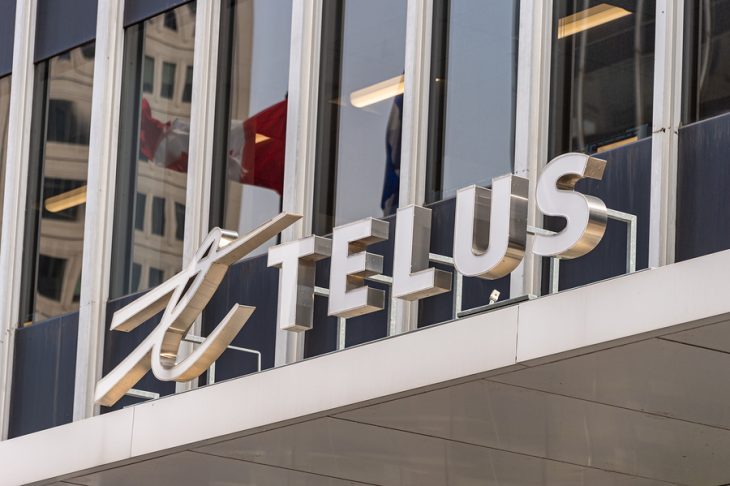
By Greg O’Brien
VANCOUVER – As expected, Telus executives said their company is very well positioned to weather whatever storm the newly launched Shaw Mobile releases into the Albert and British Columbia telecom marketplace.
Pointing to its long-term track record, relationships with its customers and solid distribution channels (Telus has 300-plus retail stores in the two provinces compared to 19 for Shaw, although the latter does have additional retail partners like Wal-Mart), company executives on its second quarter results conference call with financial analysts on Friday sounded pretty confident they have prepared well for this new competitive brand.
“We’ve been expecting the Shaw Mobile launch for four years now,” said Jim Senko, president, mobility solutions. “We’ve been actively bundling our base, simplifying our offers and ensuring we’re simple and transparent for our customers.”
When asked by analysts how many of its western customers already benefit from bundled Telus home and wireless services (according to CRTC figures, the company has 40% of the wireless market in Alberta and B.C.), Senko was guarded on numbers because of the competitive sensitivity. Unbundled customers are seen as the most at risk of switching carriers.
“It’s a very manageable unbundled base right now,” he said. “We’re very comfortable with where we are. Our customers have really responded well to our bundling and I think that’s been one of our areas of great success.”
Added CEO Darren Entwistle, who couldn’t resist a shot Gatineau’s way: “We have a decided preference any day of the week for vigorous competition over onerous regulation.”
During the call and in its Q2 results, Telus also pointed to the growing success of its health and international divisions. “We’re seeing significant growth with increased revenues from the hyper-scaling of our virtual health care solutions where we’ve seen a tenfold increase in demand for Babylon by Telus Health and 300 new corporate customers within our Akira virtual care platform,” since the beginning of the Covid-19 pandemic added Entwistle.
The shift to virtual doctor visits by Canadians during the crisis certainly seems like something which will stick going forward, added Francois Gratton, EVP and group president for Telus Health and chair of Telus Quebec. “A recent study by the Canadian Medical Association found that nearly half of Canadians who use virtual care during the pandemic would prefer a virtual-first point of contact going forward,” he said.
“We’re now forecasting to reach over 420% and 350% growth increases for both Babylon and Akira and their customer base, respectively, by the end of the year,” Gratton added. Babylon has 26,000 participating Canadian doctors who have done more than 165,000 virtual visits since the beginning of the pandemic.
Telus Health now manages health and wellness benefits of 13 million Canadians, processes claims for 60,000 allied health care providers, provides executive health care services for over 2,000 employers, enables 6,500 pharmacies to dispense medications via the Telus pharmacy management systems, and supports 200,000 Canadians with provincial personal health records in Alberta and Saskatchewan.
With so much already done, and so much more growth apparent, one analyst asked when the company might go to the capital markets to fund more expansion (this is how they ask if a division might be spun off in a public offering) since a number of other new digital health care companies in the U.S. are dramatically growing in value right now.
Gratton batted the question aside, saying while demand for what Telus Health offers is “exploding,” the company is focused on building right now and serving customers – and doing it profitably. “If you look at players in the U.S. that are trading on a revenue multiple without any kind of profitable business model, that’s not the way we’re going at it,” he said. “When it comes to monetizing or benefiting from doing an IPO, I think that’s further down the line.”
Entwistle pointed out that if single-product health tech companies which are not yet making any money are now valued so high in the market right now, a multi-product, profitable division like Telus Health should make Telus itself far more valuable.
What is far closer, however, is a public offering for Telus International, the company’s high growth global division that offers call centre, customer experience, digital experience, IT, and other advisory services which has earned over $1 billion in revenue so far this year and seeing double-digit growth.
An IPO for that division should come in 2021, said Entwistle.
“TI has worked really hard, delivering fantastic results, building great assets with a great management team, to earn the right to take the business public… I’m looking to get that done in the next 12 months and right now that’s what we’re focused on in terms of accessing the capital markets,” he explained.
“I think the trajectory that’s been established in terms of operational, customer service and economic performance bodes well for our ability to tap into the capital markets, all things being equal, in the first half of 2021. Our goal here is to be ready to go and then go if market conditions allow.”


